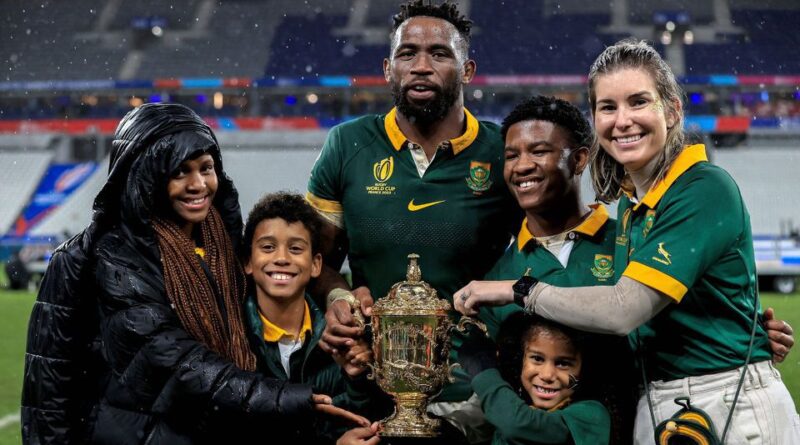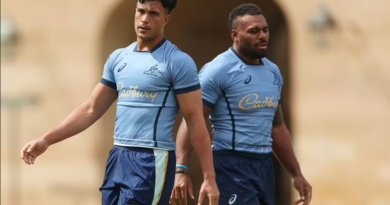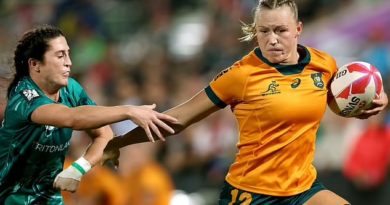SPRINGBOKS CAPTAIN SIYA KOLISI: My Mother’s Face Was Covered In Scars…Witnessing Abuse Led Me To Heartbreak And Greatness
Springboks captain Siya Kolisi opens up about his difficult childhood, shaped by adversity and violence, and how he overcame personal struggles to become a symbol of hope, courage, and resilience.
Siya Kolisi’s journey from hardship to greatness is a story filled with pain, struggle, and ultimate triumph. Born in the tough township of Zwide in Port Elizabeth, Kolisi’s childhood was shaped by poverty, violence, and personal loss. One of his earliest memories is holding his grandmother in his arms as she passed away, a moment that would haunt him for years. In his 2021 book Rise, Kolisi recalls the pain of losing his grandmother, who was his closest companion.
Growing up in an environment where hunger and violence were constant, Kolisi learned the harsh realities of life at a young age. He witnessed his mother being beaten by men, and at just five years old, he found her teeth after another assault. “I see some of the men who beat her in the streets when I go home, and it hurts that nothing ever happened to them,” he says, reflecting on the anger that still lingers inside him.
Despite the turmoil at home, Kolisi’s resilience began to take shape. He grew up in a world where boys were expected to be tough and silent about their struggles. For years, he carried his trauma alone, turning to unhealthy coping mechanisms, including sniffing petrol to numb the pain.
Kolisi’s life took a turn when rugby coach Eric Songwiqi noticed his potential. Though Kolisi was malnourished and had limited exposure to the outside world, Songwiqi pushed for him to attend Grey High School on a rugby scholarship. “There were three of us, but I was very small. So he forced [Grey] and said, ‘If you want these two, you have to take this one,’” Kolisi remembers.
At Grey High, a predominantly white school, Kolisi faced a steep learning curve. He struggled with English and felt out of place. But he formed a strong friendship with Nick Holton, a fellow student who helped him learn the language and adapt to his new environment. Kolisi embraced the opportunity, knowing it was his chance to change his life and help his family. For the first time, he had consistent access to food and education—privileges he had never known.
But as Kolisi’s life improved, the realization that many talented children in Zwide were being left behind weighed heavily on him. He recalls, “It was just a 15-minute drive [from Zwide to Grey], and that’s all it took for me to start dreaming differently.”
By 2013, Kolisi had made his debut for the South African national team, the Springboks. However, his newfound fame came with its own set of challenges. He struggled with alcohol as a way to cope with the pain of his past. “I drank when I was happy or sad, or dealing with something,” he admits. This destructive habit affected his relationships, especially with his wife, Rachel, whom he married in 2016.

It wasn’t until 2019 that Kolisi began confronting his inner demons. Encouraged by Rachel, he sought guidance from a mentor, Ben Schoeman, who forced him to face the truth about his actions. “Siya, you drink a lot, you fool around with women, you go to strip clubs. You post on social media about your faith in Christ, but you’re lying to yourself and everyone else,” Schoeman told him. These harsh words prompted Kolisi to reassess his life, and he gradually embraced sobriety, learning to confront the pain he had buried for so long.
Despite these efforts, Kolisi and Rachel recently announced their divorce, shocking fans who had seen them as a strong couple. Kolisi’s vulnerability is evident as he navigates this difficult chapter. “I’m still learning how to have a proper conversation with her,” he admits, revealing the emotional toll of past traumas.
Kolisi’s memories of his mother’s suffering remain vivid, especially when he encounters the men who abused her. “I see this one guy, and I remember the day I watched him beat up my mother. I get so angry, but I must control myself,” he says. These unresolved issues continue to weigh heavily on him, but Kolisi is determined to move forward and be honest about his struggles.
Despite his success, Kolisi is aware of the imperfections in his life. “I’m not a saint at all. I’m a sinner trying to be the best he can be every day,” he says, accepting his flaws. His rise from a childhood of pain to a national hero inspires millions, but he’s committed to being transparent about the challenges he still faces.
Kolisi’s advocacy for gender violence is deeply personal. After the Springboks’ historic World Cup win in 2019, he vowed to use his platform to help other women suffering from abuse. “Rachel said, ‘You couldn’t help your mother or your aunt, but you can help other women,’” Kolisi reflects. His commitment to this cause stems from his own experiences growing up in a home marked by violence.
Kolisi is also a strong advocate for mental health and emotional vulnerability. He encourages men to talk about their struggles and break free from the toxic norms that equate masculinity with silence. “Sometimes a break is good, but it will be even better to go back and talk some more. It always helps to talk,” he says.
Siya Kolisi’s story is one of redemption, resilience, and vulnerability. From the streets of Zwide to lifting the World Cup, his journey is a testament to the power of confronting one’s demons, seeking help, and using one’s platform for good. Though his struggles are far from over, Kolisi remains determined to be a force for change, not just on the rugby field, but in the lives of others.



